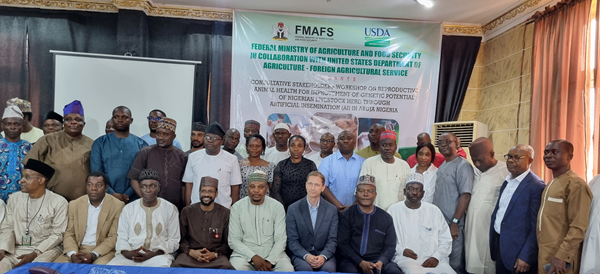
The Federal Ministry of Agriculture and Food Security (FMAFS), in partnership with the United States Department of Agriculture, Foreign Agricultural Service (USDA-FAS), recently convened a consultative workshop aimed at improving the genetic potential of Nigeria’s livestock.
The workshop, titled “Consultative Stakeholders Workshop on Reproductive Animal Health for Improvement of Genetic Potentials of Nigerian Livestock Herd through Artificial Insemination,” was held in Abuja, gathering key stakeholders to explore strategies for enhancing livestock productivity.
Special assistant to the president on livestock development, Hon. Idris Abiola-Ajimobi declared the workshop open, emphasising President Bola Tinubu’s commitment to revamping Nigeria’s livestock sector. He reiterated the government’s determination to tackle the challenges facing the livestock industry and improve its productivity. “This is to further demonstrate the President’s commitment to resolving the issues facing our nation. He has mandated us to do whatever is necessary to develop and enhance productivity in the livestock sector,” Abiola-Ajimobi said.
Director of animal health and clinical services at FMAFS, Dr. Musa Mohammed underscored the importance of addressing the country’s poor genetic pool of livestock species. He noted that Nigeria’s livestock yields significantly less compared to other African countries. “In Nigeria, a cow may give only three liters of milk during the wet season, while in other African countries, one cow can produce between 15 and 20 litres daily. During the dry season in Nigeria, it can be hard to get even one liter due to poor nutrition and a weak gene pool,” Mohammed explained. The workshop, he said, aims to educate stakeholders on the importance of improving livestock genetics to boost productivity.
Represented by Nigeria’s Chief Veterinary Officer, Dr. Columbus Vakuru, Mohammed explained that the workshop is targeting both large ruminants, such as cows for dairy and beef production, and small ruminants for meat. He emphasised that the key objective is for workshop participants to spread this knowledge to farmers at the grassroots level, collaborating with the Federal Government to improve livestock genetics in rural areas.
“After this workshop, participants and farmers will return to the grassroots and pass on what they have learned. They will work with the federal government to engage real farmers, convincing them to adopt these new ideas,” Mohammed said. He noted that some farmers hold reservations about new genetic practices, but added that Nigeria must improve food security to cope with its growing population. “We are growing in population, and food security is a problem. If we cannot feed ourselves, we will face even greater challenges.”
Mohammed also highlighted the workshop’s potential to improve farmers’ livelihoods, boost the national economy, and increase food supplies. He explained that improving the genetic pool through methods such as artificial insemination will yield more productive livestock, which will benefit both farmers and the nation.
Counselor for USDA-FAS, Mr. Chris Bielecki expressed hope that the workshop would introduce new strategies to further enhance the genetic potential of Nigerian livestock. He stressed the importance of continued collaboration between Nigerian and U.S. experts to share ideas on improving livestock production.
Additionally, special assistant to the minister of agriculture and food security, Dr. Mustapha Popoola encouraged stakeholders to explore genetic resources and gene banks. He pointed out that while Nigeria has developed financial institutions, the country lags behind in genetic resource banks, which are critical for long-term livestock improvement. “We should start exploring the concept of gene banks. Nigeria has many commercial banks, but we need gene banks like those found in the United States, where they have central and commercial banks. The National Gene Bank Concept is a key idea that the federal government supports,” Popoola said.
Deputy director of veterinary services at FMAFS, Dr. Adamu Dakogi provided an overview of the workshop’s objectives. He explained that the key goal was to educate Nigerian dairy and livestock breeders, including small- and medium-scale farmers, on how to improve livestock production through artificial insemination. He added that the workshop serves as a platform for exchanging ideas with U.S. partners on the benefits of livestock genetic resources. The aim is to introduce these advanced concepts to local and indigenous farmers in Nigeria, helping them improve their livestock’s genetic potential and increase productivity.
Dakogi also emphasised the role of artificial insemination in breeding more productive cattle, which would not only enhance local farming operations but also facilitate global trade in livestock. By improving genetic advancement, farmers could protect their investments and ensure higher returns.
The workshop drew participation from a wide range of stakeholders, including representatives from the Ministry of Agriculture and Food Security, the National Veterinary Research Institute, the National Animal Production Research Institute (NAPRI) in Zaria, the Nigeria Veterinary Medical Association, commercial livestock farmers, community associations, and the private sector.
The event marked an important step in the ongoing efforts to boost Nigeria’s livestock sector through advanced genetic practices, aiming to secure the nation’s food supply and improve the livelihoods of farmers.


